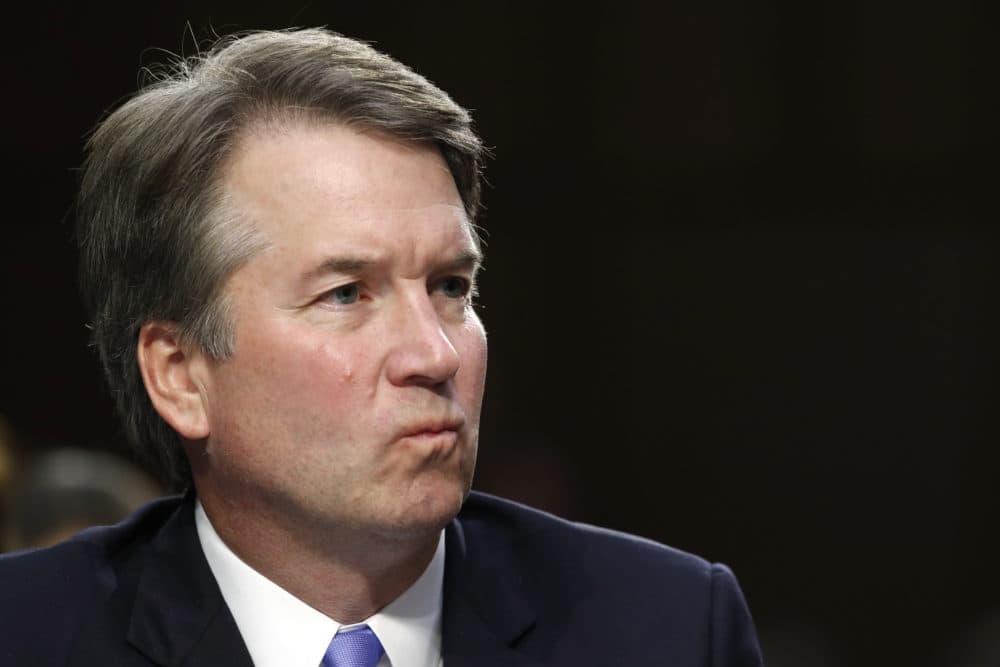Advertisement
Commentary
Brett Kavanaugh And The Fraud Of Originalism

For sheer suspense, the question of which Trump official wrote the anonymous op-ed beats Brett Kavanaugh reaching the Supreme Court by a D.C. mile. If reporting can be believed, Republicans have the votes, after last week’s confirmation hearing, such that Kavanaugh can try on his robe now. The grilling he got, in one observer’s take, matters only as the starting pistol for the debate over SCOTUS’s future, when it may consider abortion, affirmative action, labor rights, presidential power and other nitroglycerin issues.
“Originalism,” the philosophy Kavanaugh promised would guide him on the court, won’t be part of that future. It’s a fraud, unworkable as a reading light on the Constitution, and Kavanaugh and everyone else knows it.
Originalism, which holds that justices should interpret the Constitution and its amendments only as their drafters originally intended, isn’t Kavanaugh’s approach, according to scholars who’ve looked at his record. Instead, from finding constitutional sanctions for pro-business, anti-regulation, pro-presidential power views, Kavanaugh’s writing and rulings seem to support his preconceived political opinions, not the original intentions of the drafters.
This makes him typical. As an enlightening op-ed by Max Boot notes, originalism was disdained even by its most famous advocate, the late justice Antonin Scalia. Right-wingers tout the doctrine as the only straitjacket on out-of-control judicial activism, but in reality, Boot demonstrates, both liberals and conservatives, Scalia included, rule in accord with their personal politics.
Boot, a national security senior fellow at the Council on Foreign Relations, is generally conservative (albeit anti-Trump) and once endorsed the originalism he now condemns. What changed his mind, he writes, was the realization that it’s impossible to know what the Founders intended:
“What if, as was often the case, one Founding Father disagreed with another? What if, as is also frequently the case, the court has to rule on matters that, because of technological or social developments, were unforeseen by the founders? And what if a justice’s interpretation of ‘original intent’ is at odds with decades of precedents — is it ‘conservative’ to overturn the prevailing line of cases?”
Boot quotes Judge Amy Coney Barrett, whom social conservatives prayed Trump would nominate to the court, as saying originalism could require “the dismantling of the administrative state, the invalidation of paper money, and the reversal of Brown v. Board of Education” (which desegregated schools) — all developments that came decades after the Constitution was adopted. Only racists or the looniest libertarians would banish these basics of modernity.
[Originalism is] a fraud, unworkable as a reading light on the Constitution, and Kavanaugh and everyone else knows it.
Scalia certainly didn’t support such nuttiness. In fact, Boot notes, that conservative icon applied his originalism judiciously (sorry), when it suited his political opinions. He and the court’s conservative majority halted the 2000 vote recount in Florida, and handed the presidency to George W. Bush, on the grounds of the 14th amendment, proposed in 1868 to give freed slaves especially the “equal protection of the laws.” The 14th’s drafters surely never foresaw the amendment’s application to a presidential recount.
Another Scalia majority opinion held that the Second Amendment allows an individual to possess a gun. “How is it that no court in the previous 218 years had ever discovered this ‘right’ if it had been there from the beginning?” Boot asks.
Because it hadn’t been, he suggests, citing historians who say the Second aimed to avert federal disarming of state militias, not individuals. Scalia’s opinion likely had more to do with his being a “gun owner and avid hunter,” Boot says.
You can read his column for the list of other recent Court decisions, with conservative votes, that flunk the originalist smell test. Or you can consider his conservative Post colleague George Will, who floated uncomfortable questions for originalists, such as how their philosophy can justify the Brown decision without resort to racism? Or how it could prohibit whipping and mutilation of prisoners, which, Will says, were allowed even when the Eighth Amendment first banned “cruel and unusual punishments”?
This isn’t to say that only conservative judges legislate from the bench (liberals celebrated Roe v. Wade despite what constitutionally minded ones call its dubious grounds). It is to say that you should ignore the originalist background noise as we and the high court debate contentious legal and moral issues going forward.
